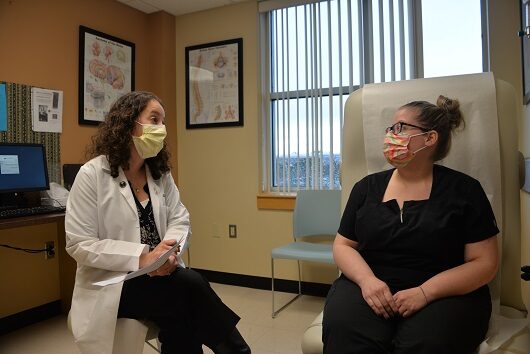Spina Bifida Clinic Established

Multidisciplinary Clinic Provides Care from Childhood Through Adulthood
Albany Medical Center has established a multidisciplinary transitional spina bifida clinic designed to provide care for patients throughout their lives. It is one of few such clinics in the country, and the only one in the Capital Region.
Spina bifida is a congenital disorder in which the brain or spinal cord, and/or their protective coverings, fail to develop properly before birth. The resulting nerve damage is permanent, leading to varying degrees of paralysis, difficulties with walking and standing, and bowel and bladder problems. The flow of cerebrospinal fluid around the brain and spinal cord is often affected, resulting in hydrocephalus.
Albany Medical Center’s spina bifida clinic is designed to address patients’ complex needs through a coordinated approach. The clinic includes medical providers from neurosurgery, orthopedic surgery, urology, gastroenterology, and physical medicine and rehabilitation who see patients the second Friday of each month.
“This patient population requires comprehensive medical care that is best performed as a team. Together, we review each case and discuss the best approach to that patient’s individualized care,” explained Matthew Adamo, MD, a pediatric and adult neurosurgeon and medical director of Albany Medical Center’s spina bifida clinic.
“Patients can receive all of their care in a timely and concise manner,” Adamo added.
Without a comprehensive clinic, care for spina bifida patients is time consuming and often costly due to the travel involved. Patients may have difficulty with transportation or time off from work.
As a child, patient Mary Langelier, 35, of Latham can recall frequent three-hour car rides to Boston. “It was a lot of traveling back and forth, it took a lot of time, and we had to pay for gas and food. We had to pack up all my equipment (including a wheelchair) each time. It was a hassle,” Langelier recalls. “Having all of my appointments at once right in Albany makes such a difference, and it means so much to me that my physicians talk to one another. They all know me, and they all know what’s going on with my care.”
Children and adolescents attend the pediatric spina bifida clinic until they are 21 and then easily transition to the adult clinic.
“When patients become adults, their difficulties don’t go away. Now we can continue to help them with their needs throughout their lives,” Adamo said.
For more information about Albany Medical Center’s spina bifida clinics, call 518-262-5401 (pediatrics) or 518-262-5088 (adult).